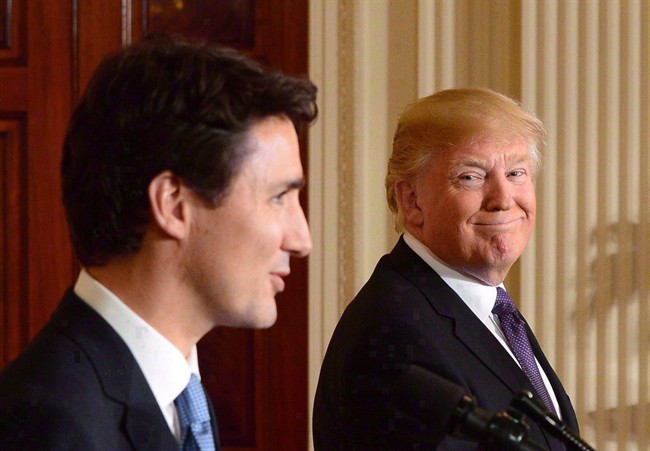Prime Minister Justin Trudeau was all smiles Thursday in Saskatchewan as he faced questions about how he single-handedly convinced U.S. President Donald Trump to not blow up NAFTA.

Well, not exactly single-handedly. The president of Mexico helped, too. So did Trump’s own commerce and agriculture secretaries. Oh, and not to mention several top Republican senators.
But in his public remarks, Trump did specifically cite his admiration for Trudeau as one reason why he agreed to renegotiate NAFTA instead of withdrawing altogether. Apparently, Trump was all set to pull the pin on this NAFTA grenade this weekend, as a way of marking his 100th day in office. Fortunately, sanity appears to have prevailed — at least for now.
It’s still not exactly clear what changes Trump or Trudeau are hoping to see. In fairness to Trudeau, though, it’s not as though he was going out of his way to push for changes to NAFTA. Obviously this situation has been thrust upon him.
READ MORE: Trudeau says Trump was prepared to exit NAFTA until the duo had a chat
What has become abundantly clear, though, is that Canada needs strong voices in support of free and open trade. Trudeau hasn’t always seemed like trade liberalization’s biggest champion, but let’s hope he can rise to the occasion.
No one is claiming that NAFTA is a perfect agreement as it currently stands, or that it would be impossible to improve it in any way, but how exactly do these leaders want to see it improved? What specific changes would they like to see? What are they willing to put on the table? None of this is clear at all.
President Trump seems to view this all as a business negotiation, so it’s likely that for him “improvements” to NAFTA mean concessions from Canada and Mexico. We should remember, though, that Trump’s tough talk on renegotiation or abandoning NAFTA is not unlike the platform that Liberals ran on in the 1993 election.
In fact, Trump’s not all that unique in that leaders typically want to have their cake and eat it too. Wanting to “protect” domestic industries and jobs while at the same time looking for the other guy to drop trade barriers seems fairly common – and Trudeau is guilty of this to a certain extent, too.
For example, Trudeau tweeted Thursday about a visit to a farm in rural Saskatchewan and how his government is “working hard to help canola farmers … get stable (and) predictable access to world markets.”
That certainly sounds like a commitment to trade liberalization. So far, so good.
READ MORE: Donald Trump planned on giving Canada only 5 days’ notice of NAFTA withdrawal
The statement earlier in the week from Natural Resources Minister Jim Carr in response to the U.S. imposing new softwood lumber tariffs is similarly positive. Carr warns this will “negatively affect people’s jobs on both sides of the border and … increase costs for American families who want to build or renovate homes.”
So while the Liberals are touting the benefits of open markets and the harm to the economy and consumers from protectionist policies, they’re also vigorously defending Canada’s incredibly protectionist supply management system for dairy. This is a policy that includes massively high tariffs on dairy imports and ultimately imposes considerable costs on Canadian consumers.
These same Liberals, in the last election, refused to commit to the Trans Pacific Partnership (TPP), because, after all, we have to “protect” things like “supply management, our auto sector, and Canadian manufacturers across the country.”
You might say we’re trying to have our cake and eat it, too.
Of course, Trump has all but killed the TPP. Moreover, the backlash against trade liberalization and globalization is not confined to just the US. It’s hard to be optimistic about the short term future of free trade, but that shouldn’t be an excuse for Canada’s leaders to abandon the cause.
The good news, though, is that the power to abandon harmful protectionist policies lies within Ottawa’s reach. We can even dress it up as a “concession” to the US in NAFTA talks, if we think that might help.
Canada has benefitted tremendously from free trade. We need our leaders to keep fighting for it.
Rob Breakenridge is host of “Afternoons with Rob Breakenridge” on Calgary’s NewsTalk 770 and a commentator for Global News.



Comments